Turkey Launches Attacks Against Kurdish PKK In Iraq
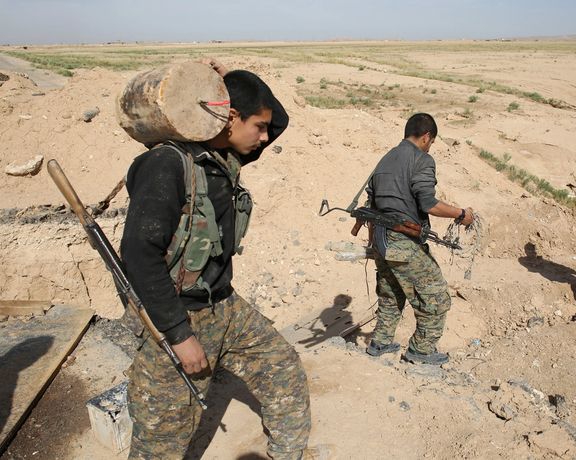
Turkey attacked Kurdish militant targets in northern Iraq in an air and land operation that targeted camps and ammunition stores, Turkey's defense ministry said on Monday.

Turkey attacked Kurdish militant targets in northern Iraq in an air and land operation that targeted camps and ammunition stores, Turkey's defense ministry said on Monday.
The military action was part of a long-running Turkish campaign in Iraq and Syria against militants of the Kurdistan Workers Party (PKK) and the Syrian Kurdish YPG militia, both regarded as terrorist groups by Ankara.
Alongside the air operation, commandos and special forces also participated, both by land and air.
"Our operation is continuing successfully as planned," the state-owned Anadolu news agency quoted Defense Minister Hulusi Akar as saying. "The targets identified in the first phase have been captured."
Artillery also fired on militant targets in the military action, it said. No information on casualties was given.
The action, called "Operation Claw Lock", aimed to "prevent terror attacks" and ensure border security following an assessment that the PKK was planning a large-scale attack, the ministry added.
Turkey regularly launches air strikes into northern Iraq, a region into which it has repeatedly sent commandos, to support its offensives.
The PKK took up arms against the Turkish state in 1984. More than 40,000 people have been killed in the conflict, which in the past was mainly focused in southeast Turkey.
Iran also has armed Kurdish opposition in Iraq, although they separate from the PKK, which mainly operated Turkey and Iraq.

Iran's military will target Israel's heart if it makes "the slightest move" against the Islamic Republic, President Ebrahim Raisi told a military parade Monday.
"If you make slightest move against our nation ... our armed forces destination will be the heart of the Zionist regime," Raisi said in a televised speech from the Army Day parade in Tehran.
Raisi also referred to ever-closer cooperation between Israel and Arab states that have normalized relations with the Jewish state.
“Our message to the Zionists is that if you pursue normalization with regional countries, you must know that your smallest action is not hidden from our armed forces and intelligence bodies…,” he said.
The establishment of full relations between the United Arab Emirates and Bahrain, two Persian Gulf Arab states with Israel in 2020 was a significant setback for the Islamic Republic that has campaigned tirelessly in isolating what it calls “the Zionist enemy”.
Tehran’s nuclear program and support for militant groups in the region is what hastened the establishment of ties between Arab states and Israel, which have begun to cooperate on military and intelligence areas.

In February, Israeli defense chief Benny Gantz visited the small Persian Gulf country of Bahrain to expand cooperation, after Iran-backed Yemeni Houthis attacked UAE with missiles and drones in January.
In March, the UAE, Bahrain, Egypt and Morocco held a summit in Israel, in what was a historic development in the Middle East.
Raisi compared the Islamic Republic’s adversaries to Iraq’s Saddam Hussein who attacked Iran in 1980, a year after the establishment of the new revolutionary regime. Eight years of war followed with neither side winning. Saddam was eventually overthrown by a US invasion in 2003 and hanged by a new government.
Raisi said Iran’s enemies should look at what happened to the Iraqi leader and draw their own lessons.
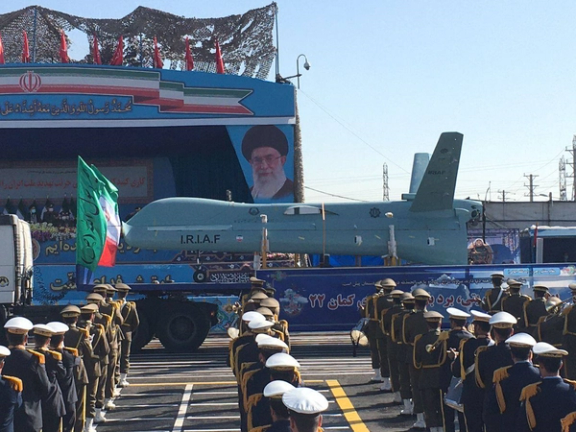
He also drew attention to Biden administration statements that the US ‘maximum pressure’ sanctions against the Islamic Republic have failed. Iranian officials have been using this line of attack against the United States, after the State Department on January 25 criticized former president Donald Trump’s withdrawal from the 2015 nuclear agreement known as JCPOA, and the imposition of sanctions on Iran.
“Today, the State Department spokesman announces in front of the whole world that we [the US] are disgracefully defeated in sanctioning and [exerting] maximum pressure on Iran, and this is the fate of those who want to confront the Islamic system,” Raisi said.
Iran’s Supreme Leader Ali Khamenei had also used this argument, saying the US was defeated and has to agree with Iran’s terms in a new nuclear deal.
Nuclear negotiations that began in April 2021 have stalled as Tehran has demanded the removal of the Revolutionary Guard (IRGC) from the US list of Foreign Terrorist Organizations (FTO).
Top Iranian officials while insisting on their “red lines” in the talks, are trying to put up a brave face, insisting that that they have been able to circumvent US sanctions by exporting more oil and repatriating the funds. The Biden administration apparently relaxed the enforcement of sanctions in 2021 as it was trying to reach a new agreement with Tehran to restore the JCPOA.
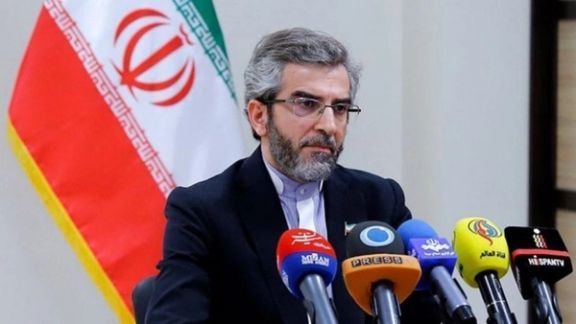
Iran's Deputy foreign minister and chief nuclear negotiator Ali Baqeri-Kani says Tehran's foreign and military policies are synergistic and complementary.
Speaking at a meeting with a group of army commanders on Sunday, Baqeri-Kani said that the Islamic Republic has thwarted the enemy's trick in driving a wedge between foreign policy and defense policy thanks to resistance under the guidance of Supreme Leader Ali Khamenei.
He said the discourse of resistance is dynamic and promotes stability, adding that lasting regional security depends on resisting aggression and occupation.
The Iranian diplomat also criticized regional Arab governments for normalizing their relations with Israel, saying such moves will never help those countries feel secure, noting that “History has proven aggression and occupation will never lead to order, stability and calm.”
“The interaction between some regional governments and the Zionist regime is similar to taking refuge in a wolf’s lair to protect oneself from the blissful spring rain”, he added.
Israel’s establishment of full relations last year with the United Arab Emirates and Bahrain was a sign of Tehran’s inability to isolate its archenemy in the region.
Baqeri-Kani, who is also Tehran’s top negotiator in Vienna talks to restore Iran’s 2015 nuclear deal known as JCPOA, made no comments about the current state of the negotiations, which came to a halt in March as Tehran demanded the removal of its Revolutionary Guard from the US list of terrorist organizations.
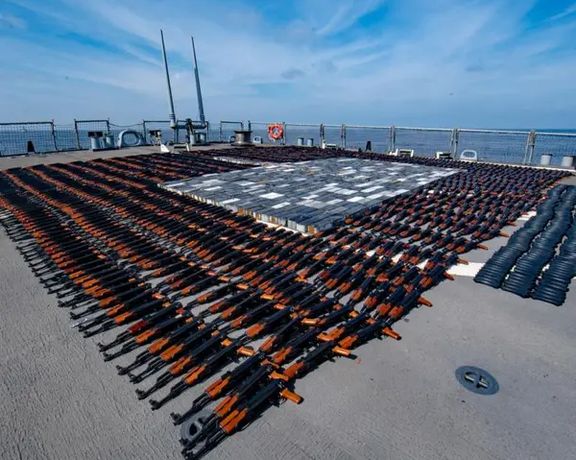
Iran-backed Houthi rebels in Yemen have criticized a new US-led multinational taskforce that will patrol the Red Sea following a series of attacks attributed to the group.
The Houthis’ chief negotiator and spokesman, Mohammed Abdul-Salam, said late Friday that formation of such a taskforce amid a cease-fire in the country’s civil war contradicts Washington’s claim of supporting the UN-brokered truce.
He said on his Telegram social media account that the US taskforce “enshrines the aggression and blockade on Yemen”, referring to the Saudi-led coalition’s blockade of Houthi-held areas. The rebels seized Yemen’s capital, Sanaa, in September 2014, about a year before the coalition entered the war on the side of Yemen’s legal government.
Iran has long been accused of smuggling weapons to the Houthis, a charge Tehran denies, but the US has seized a few shipments of Iranian weapons destined for Houthis.
The new naval task force will consist of up to eight vessels and will be part of the 34-nation Combined Maritime Forces, which has three other task forces in nearby waters targeting smuggling and piracy.
Its launch comes amid a two-month truce in the nearly seven-year Yemen war that has killed tens of thousands of people and displaced millions more, and pushed the Arab world’s poorest nation to the brink of famine.
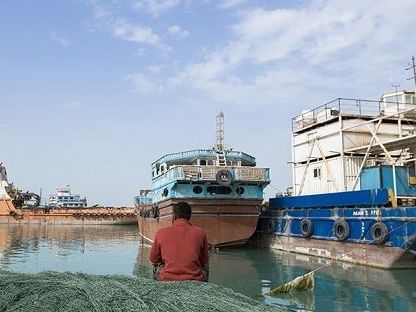
Iran's Revolutionary Guards say they seized two vessels in waters south of Iran, one carrying 250,000 liters of smuggled fuel and another loaded with 130,000 liters.
According to a report by ISNA, one of the vessels was seized in Persian Gulf waters near the Ameri Port in Bushehr province, and the other in Hormozgan province near the Jask Port on the Gulf of Oman on Friday.
Head of the Public Relations Department of the IRGC Navy Colonel Gholam-Hossein Hosseini said that the first ship's seven crew have been detained.
Last week the Guards had seized another vessel carrying 220,000 liters of smuggled fuel in the Persian Gulf and detained its crew of 11.
In recent weeks, IRGC naval units say they have managed to seize a total of 650,000 liters of smuggled fuel from the vessels they seized and handed them over to local judicial authorities.
The sizes of cargos involved indicate these were relatively small vessels transporting oil between local ports. Large tankers carry hundreds of thousands of barrels of oil.
Iran has boarded and seized foreign-flagged tankers in the past. One major incident occurred in January 2021 when the IRGC seized a Korean tanker for what seemed to be Iranian pressure on Seoul to release around $7 billion of funds frozen because of US sanctions.
The US Navy in the Persian Gulf region is known to have intervened in some instances to protect tankers.
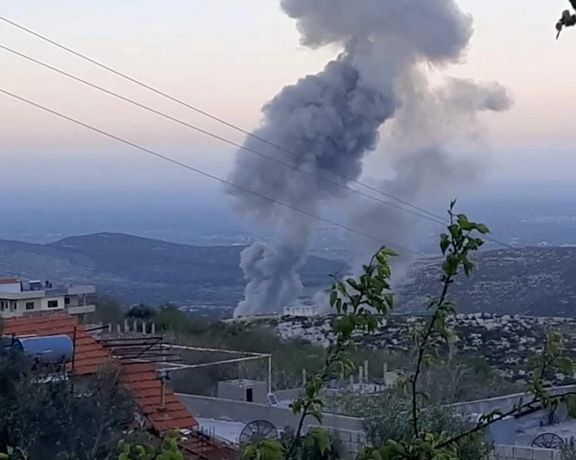
Syrian state television says Israeli airstrikes hit several locations in the countryside west of the capital Damascus on Thursday.
SANA, citing a military source, said Syrian air defenses had shot down "some" of the missiles fired.
Saying the strikes only caused physical damage but did not specify further, it added “An Israeli air raid targeted certain positions near Damascus”.
Saudi state-owned Al-Hadath TV reported the attack targeted Iranian radar systems.
The last airstrike in Syria attributed to Israel was on Saturday during the daytime, which is rare.
Israel has mounted frequent attacks against what it has described as Iranian targets in Syria, where Tehran-backed forces including Lebanon's Hezbollah have deployed over the last decade to support President Bashar al-Assad in Syria's war.
A pro-government allied commander denied to Reuters that Thursday's strikes had hit their positions outside Damascus.
The Thursday night strike happened only a day after the commander of the IRGC's Qods (Quds) Force Esmail Qa’ani gave a lengthy address saying Israel is "too small to confront us" and expressed Iran’s support for all those who fight against “the Zionist regime” and speed up its destruction.
In March, an Israeli attack over the Syrian capital Damascus killed two officers from Iran’s Revolutionary Guards and left some material damage.
The IRGC vowed to avenge the killings and subsequently launched ballistic strikes on what they claimed was an Israeli “strategic center” in Iraq’s autonomous Kurdistan region capital, Erbil.
Israel has conducted hundreds of strikes on targets in government-controlled parts of Syria mostly since 2017, but its government rarely acknowledges or discusses such operations.
With reporting from Reuters